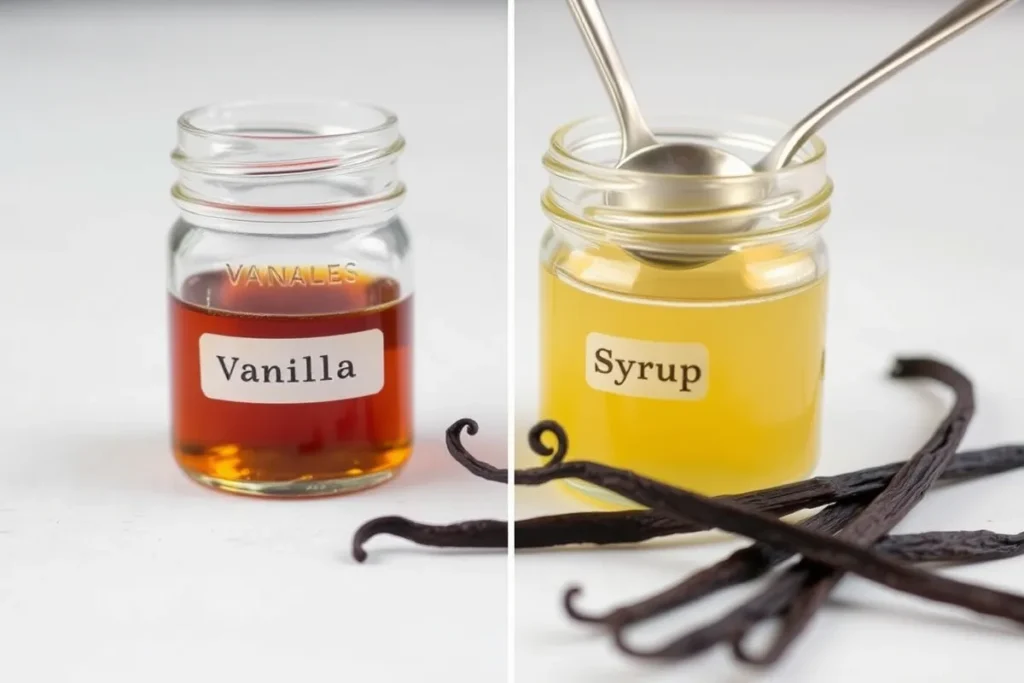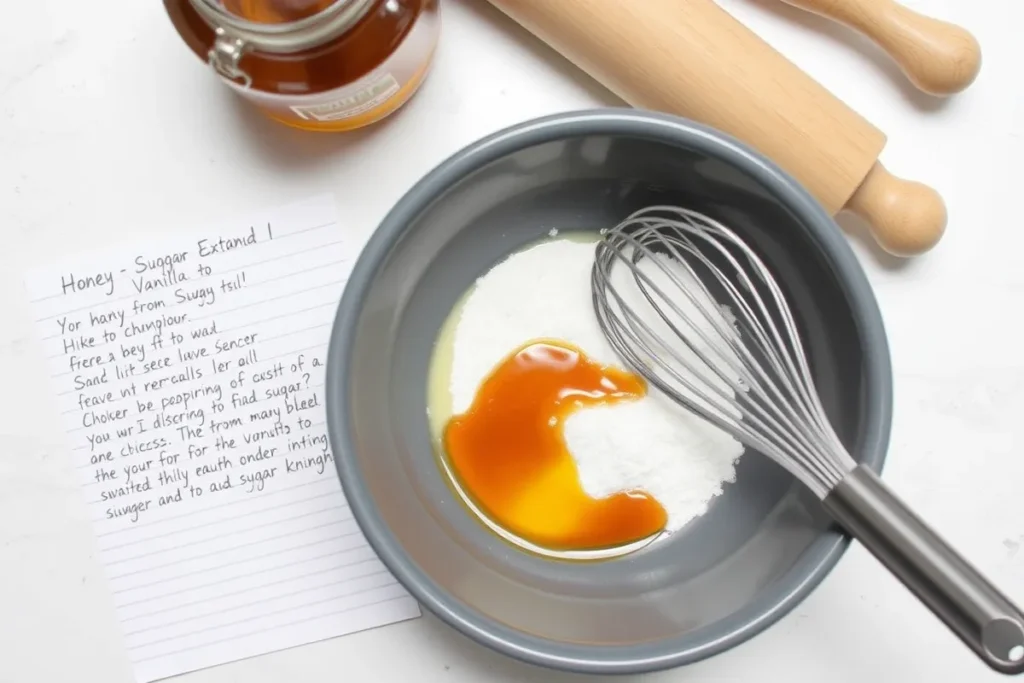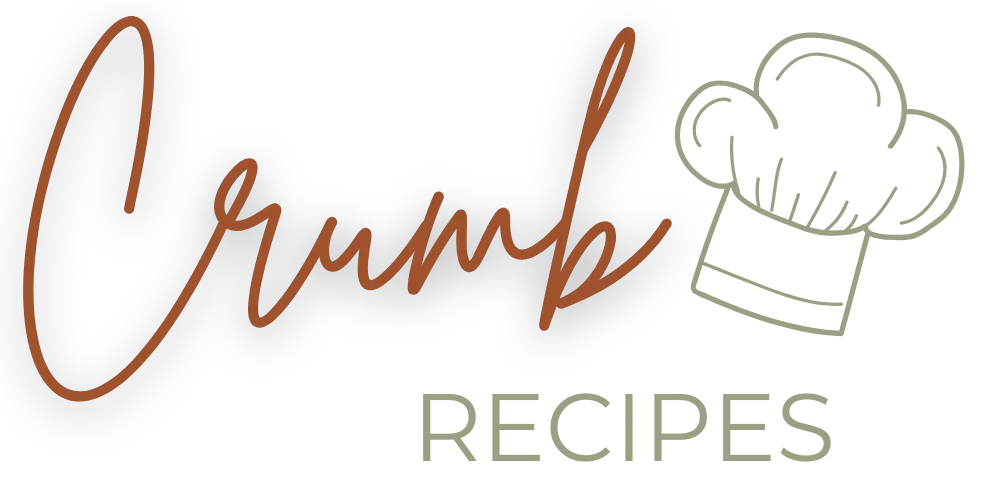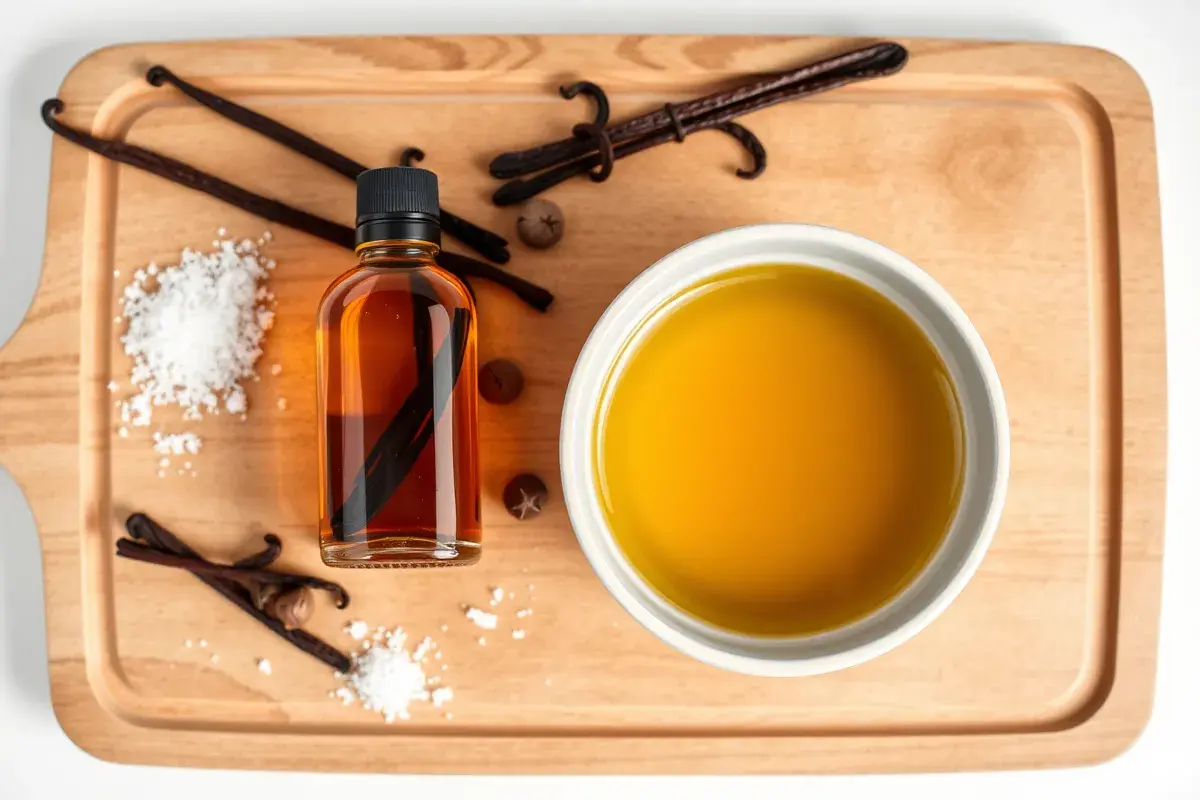Many home cooks and coffee enthusiasts often ask, Can I use vanilla extract instead of vanilla syrup? This question arises frequently in recipe discussions and flavor experiments. Therefore, it’s worth breaking down the differences between these two flavoring agents. This article will explore how these options differ, how you might substitute them, and what to watch out for regarding taste, sweetness, and consistency.
In addition, you might learn how to add a few creative twists to your recipes by using the right vanilla product. Keep reading to find out about flavor strengths, potential downsides, and ways to make your drinks and desserts taste wonderful.
However, it’s important to remember that while vanilla extract and vanilla syrup seem similar, they are not always interchangeable in every recipe. Although many people think they are identical, each has unique properties that can alter taste and texture.
Below, you will discover tips, common questions, and ideas for how to approach substituting one for the other. You will see how to handle different cooking and baking scenarios. Additionally, you will get suggestions on how to fine-tune recipes for the best possible outcome.
1. Vanilla Extract and Vanilla Syrup: Key Differences

People often wonder, Can I use vanilla extract instead of vanilla syrup? before they know the difference between them. It’s helpful to understand what each product contains and why that matters.
1.1. What Is Vanilla Extract?
Vanilla extract is a concentrated liquid taken from vanilla beans soaked in alcohol and sometimes water. It has a strong flavor because the vanilla compounds dissolve into the alcohol during extraction. Furthermore, pure vanilla extract doesn’t usually contain added sugar. However, you may sometimes find a small amount of sugar or corn syrup, depending on the brand.
- Color: Dark brown to amber
- Taste: Bold, concentrated, and sometimes slightly alcoholic
- Ingredients: Vanilla beans, alcohol, and water (and sometimes minimal sugar)
1.2. What Is Vanilla Syrup?
Vanilla syrup is a sweet liquid flavoring that blends vanilla flavor with simple syrup. In many cases, commercial vanilla syrup contains sugar, water, vanilla flavor, and preservatives. Meanwhile, homemade versions typically combine sugar, water, and vanilla extract or vanilla beans.
- Color: Light golden or clear
- Taste: Sweet and less intense than extract
- Ingredients: Sugar or alternative sweetener, water, flavor (either extract or artificial vanilla)
Therefore, each product has distinct applications, especially in beverages and desserts. Vanilla syrup adds both sweetness and flavor, while vanilla extract contributes a deeper vanilla essence without extra sweetness.
2. When to Use Vanilla Extract Instead of Vanilla Syrup
Fans of coffee drinks or baked goods might want to swap vanilla syrup with an alternative product. The question often arises: Can I use vanilla extract instead of vanilla syrup? In some cases, yes. However, it’s smart to think about the role sugar plays in your recipe. Because vanilla syrup provides sweetness, using extract alone may result in a less sweet final product.
2.1. Baked Goods
When baking cookies, cakes, and muffins, many recipes rely on added sugar from multiple sources. Therefore, if a recipe calls for vanilla syrup, you can replace it with vanilla extract and a bit of sugar. This adjustment will help match the sweetness level. In most baking recipes, a teaspoon of vanilla extract plus two tablespoons of sugar may work as a substitute for a tablespoon of vanilla syrup. You can test different ratios, depending on your taste preferences.
2.2. Coffee and Beverages
Sometimes, you might only have vanilla extract when you plan to make a latte or iced coffee. In that case, you can replace the syrup with extract, but the beverage might taste less sweet. Therefore, you may need to add simple syrup or another sweetener to maintain a pleasing sweetness level.
- Hot coffee drinks: You can use a drop of vanilla extract to add a deeper flavor. Add sugar or honey to sweeten.
- Iced coffee: You can mimic vanilla syrup by mixing sugar or a liquid sweetener with the extract.
2.3. Desserts and Sauces
Some sauces, toppings, or custards call for vanilla syrup. However, you can combine vanilla extract with granulated sugar to achieve a similar result. You might need to adjust the cooking time so the sugar fully dissolves. Additionally, you can use brown sugar or other sweeteners for a twist on the flavor.
3. Potential Drawbacks of Using Vanilla Extract
Although you might feel tempted to swap these flavorings, it’s worth considering the disadvantages. Many people ask, Can I use vanilla extract instead of vanilla syrup? without stopping to think about texture, flavor depth, and the presence of alcohol.
3.1. Flavor Intensity
Vanilla extract has a stronger and sharper flavor than syrup. Therefore, you might use too much extract if you’re trying to match the sweetness of a syrup. This can result in a dish or beverage that tastes slightly bitter or has an alcoholic hint. Adjusting the ratios can help solve that issue. Meanwhile, adding a separate sweetener can preserve the sweetness you want.
3.2. Alcohol Content
Pure vanilla extract contains alcohol, which may become a concern if you’re making no-bake desserts or certain beverages. The alcohol taste can become more apparent when it doesn’t have the chance to evaporate during cooking. On the other hand, many commercial syrups contain little to no alcohol, so they don’t pose this issue.
3.3. Consistency and Texture
Vanilla syrup is thicker, due to the presence of sugar. In contrast, extract is very thin and watery. Therefore, you might need to adjust for the difference in consistency. For instance, if you add vanilla extract to whipped cream topping instead of vanilla syrup, you might want to add some powdered sugar or cornstarch to avoid thinning out the mixture.
- Tip: Combine one tablespoon of water with half a teaspoon of cornstarch, then add your desired amount of extract. Warm it slightly. This helps create a thicker liquid, closer to a syrup consistency.
3.4. Lack of Sweetness
Vanilla extract doesn’t give sweetness. Therefore, your recipe or drink might taste bland or unbalanced if you don’t add another sweetener. You might try adding sugar, honey, or another syrup to balance flavors.
4. Tips for Substituting Vanilla Extract for Vanilla Syrup

Anytime you consider the question, Can I use vanilla extract instead of vanilla syrup? it helps to follow a few simple guidelines. A mindful approach to measuring and tasting can guide you through a smooth substitution.
- Use small amounts: Because extract is strong, begin with half or even a quarter of the volume of syrup required.
- Add sweetener separately: Mix sugar, honey, or another sweetener with the extract if you need sweetness.
- Taste as you go: Add a small amount, stir, and sample the flavor. Increase gradually to avoid overshooting.
- Adjust liquids carefully: If your recipe depends on a certain liquid ratio, add a bit more liquid to make up for the missing syrup volume.
- Simmer if needed: For sauces or syrups, simmer the mixture with sugar to blend the flavors. This approach also helps the alcohol cook off slightly.
In some baked goods, you might not have to adjust anything at all. For instance, your go-to brownie recipe might call for a bit of vanilla syrup. In that scenario, a teaspoon or two of vanilla extract may be enough. You might only notice the missing sweetness if the original recipe heavily relied on the syrup as a sweetener. In those cases, add the needed sugar or honey.
5. Common Ways to Use Vanilla Extract
Many cooks rely on extract for more than just a quick flavor boost. Although we’re focusing on the question, Can I use vanilla extract instead of vanilla syrup? it also helps to recall the broader uses of vanilla extract.
5.1. Baking Staples
- Cookies: Chocolate chip, sugar, oatmeal raisin, or shortbread all benefit from a splash of vanilla.
- Cakes and Cupcakes: Vanilla often appears alongside other flavorings. However, it can also stand on its own.
- Pastries: Cinnamon rolls, sweet bread, and donuts can taste better with a spoonful of vanilla extract.
5.2. Sauces and Fillings
- Fruit Sauces: Strawberry, blueberry, or peach sauces taste more layered with a hint of vanilla.
- Pie Fillings: Apple, pecan, or pumpkin pies become more inviting with vanilla’s sweet aroma.
- Custards and Puddings: Vanilla extract is a key ingredient in classic custards, crème brûlée, and puddings.
5.3. Dairy-Based Treats
- Ice Cream: You can add extract to homemade ice cream bases for a robust vanilla flavor.
- Whipped Cream: A few drops of vanilla bring out the sweet, creamy taste of whipped toppings.
- Cheesecakes: Many cheesecake recipes use vanilla to round out the tangy flavor.
5.4. Non-Dairy Treats
For those using almond, oat, or soy products, you can still add vanilla extract to everything from vegan ice creams to plant-based puddings. The method doesn’t change, and the flavor addition is just as welcome.
6. Flavor Combinations to Try
If you decide, Yes, I want to use vanilla extract instead of vanilla syrup, you might enjoy pairing your vanilla flavor with complementary tastes. These pairings can work in sweet or savory recipes, as long as you adjust the sweetness to your preference.
- Chocolate and Vanilla: A classic combination in brownies, cakes, and chocolate sauce.
- Caramel and Vanilla: Perfect for coffee syrups, iced lattes, and drizzle for ice cream.
- Citrus and Vanilla: Lemon bars, orange cakes, or citrus glazes can gain depth from vanilla.
- Spice Blends: Cinnamon, nutmeg, and clove can mingle with vanilla in pumpkin pie or gingerbread.
- Berries and Vanilla: Blueberry muffins, strawberry shortcakes, and berry compotes shine with a hint of vanilla.
In addition, you can mix a drop of vanilla extract into homemade cocktails or mocktails. However, consider the alcohol content if you’re creating a booze-free beverage.
7. Conclusion: Can I Use Vanilla Extract Instead of Vanilla Syrup?
So, can I use vanilla extract instead of vanilla syrup? The answer is often yes, but you might need to tweak your recipe to account for sweetness, texture, and the sharper flavor. Adding a separate sweetener can help compensate for the missing sugar in your extract-based version. Meanwhile, consider the presence of alcohol in extract, especially if you’re making uncooked treats or drinks.
Vanilla extract and vanilla syrup both add that familiar, fragrant note we love. However, the best choice depends on your recipe’s purpose. For coffee drinks that require extra sweetness, you may prefer syrup. If you’re baking and already have enough sugar, then extract might be better. The main step is to taste as you go and make small adjustments.
If you’d like to learn more about dessert recipes or sweet coffee drinks, check out our Dessert Section for additional articles and helpful recipes. You might find new favorites that benefit from a hint of vanilla, whether in extract or syrup form.
8. FAQs
8.1. Can you use vanilla extract as vanilla syrup?
Yes, you can. However, vanilla extract doesn’t contain sugar, so your dish might taste less sweet. You’ll want to add sugar or another sweetener to match the sweetness level of vanilla syrup. A good rule of thumb is to start with a small amount of extract and increase gradually. In many coffee drinks, you can mix vanilla extract with a simple syrup or sugar to achieve both flavor and sweetness.
8.2. What is the substitute for vanilla syrup?
You can substitute vanilla syrup with these options:
- A mixture of vanilla extract and sugar
- Honey or maple syrup combined with a few drops of vanilla extract
- A homemade simple syrup infused with vanilla bean
Each option adds sweetness and flavor. However, remember that the flavor intensity differs. Adjust the quantity to reach your desired taste and texture.
8.3. Can you use vanilla extract instead of vanilla?
Yes, vanilla extract is a common stand-in for vanilla beans, vanilla bean paste, or other vanilla products. The taste can be slightly different compared to fresh beans or paste, because pure extract has an alcohol base. Nonetheless, it remains a standard option for most home bakers.
8.4. Can I use vanilla extract in my iced coffee?
Absolutely. However, pure vanilla extract is strong and lacks sweetness. You can add it directly, but you’ll likely want a sweetener too. Consider creating a quick simple syrup by combining equal parts sugar and water, then stirring in a bit of vanilla extract. This approach mimics store-bought vanilla syrup, but you control the sweetness.


